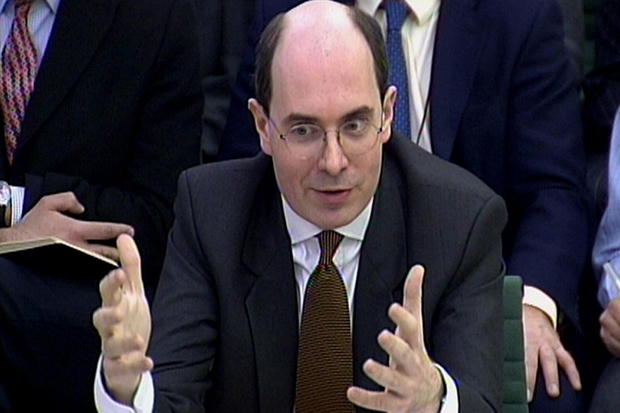Was the Financial Conduct Authority leaned on by the Chancellor to scrap its ‘review of banking culture’? Or did it decide pragmatically that its resources would be better devoted to pursuing individual cases of cheating and criminality? I suspect the answer is a bit of both.
Acting FCA chief Tracey McDermott — a no-nonsense northerner and former litigation lawyer — is reputed to be just as tough as her predecessor Martin Wheatley, who was ousted by Osborne last year, apparently for being too much the turbulent priest. Tracey became a regulator because she was interested in seeing ‘if human behaviour could be improved’ — in particular, the behaviour of people who are not dishonest by nature but are swept along by the tide. Clearly that’s a cultural issue, and the scrapped review’s declared aim to examine the link between excessive pay and the propensity to rule-bend or take excessive risk might have gone to the heart of it.
The trouble is that bankers who have made their entire careers inside the City silo since the mid-1980s have no sense of how their own conduct, or their banks’ fate, might have differed if they had been offered smaller rewards — and no one can prove the counterfactual. It’s an argument I myself tried to conduct at various times with, among many others, Bob Diamond at Barclays, Stephen Hester of RBS and Michael Spencer of the money-broker Icap. But I got nowhere (‘It depends whether you seriously think a million pounds is a lot of money,’ was the response of one trading-floor titan) and neither would another grandstanding FCA ‘review’ dealing largely in abstractions.
Better, I’m afraid, to go on naming, shaming, fining and occasionally jailing proven miscreants, however long it takes, pour encourager les autres. Meanwhile, George Osborne was said before Christmas to be ‘within weeks’ of appointing a new FCA chief. Among names tipped are the politically adept Treasury high-flier John Kingman (who might prefer to hang on for the permanent secretary’s desk about to be vacated by Sir Nick Macpherson) and a couple of eye-catching foreign regulators. But if the Chancellor doesn’t want us to think he’s gone soft on bankers, why doesn’t he confirm Tracey McDermott in post without further delay?
Gallic optimism
Following another Shanghai stampede — partly technical, partly in reaction to bad Chinese factory data — the FTSE100 lost 150 points on the first trading day of this year, having shed 1,000 points since April, and no one I know expects UK blue-chips to prosper in the next 12 months, especially if they have anything to do with mining, oil, banking, supermarkets or Europe; which is pretty well all of them. Meanwhile, your deposit account will continue to earn next to nothing, with few pundits expecting more than a quarter-point rate rise from Governor Carney’s ultra-cautious Monetary Policy Committee. As for the buy-to-let market, whacked by stamp duty and tax changes, I believe the technical term is ‘buggered’.
So what’s the prudent Spectator-reading investor to do? We shall of course address that question regularly in our Money supplements, but at best you might hope your nest-egg won’t actually shrink in value in these non-inflationary times. For something a little better than that, you might like to explore well-established peer-to-peer lending websites such as Funding Circle, RateSetter and Zopa, offering returns of between 5 and 7 per cent, typically for five-year loans.
Or, as I was doing over the new year, you might take a fresh look at France, where fund managers surveyed by Le Figaro are expecting ‘bonnes surprises’ in the form of stock-market gains of up to 15 per cent: ‘Si les investisseurs ont les nerfs solides, ils pourront sans doute encore gagner de l’argent en Bourse en 2016.’ Underpinning this outburst of Gallic optimism is a feeling that austerity is over, liquidity is ample and good businesses, especially smaller ones, are undervalued; more to the point, perhaps, lame-duck President Hollande, now focused on responding to terrorist threats, is unlikely to do anything that actually makes French economic prospects worse. That’s not much to go on, I grant you, but it’s the brightest point I can find so far in a global horizon of gloom.
Salute Sir Norman
New year honours largely cold-shouldered the City and the wider business world. Former Man Group and Prudential chairman Harvey McGrath picked up a knighthood for his ‘social investment’ work, while fashion retailer Natalie Massenet and easyJet chief Carolyn McCall became dames. But the happiest story in the list — a neat cameo of the good that can come from crazy capitalism — was that of 81-year-old Norman Stoller from Oldham, who was knighted for philanthropy.
Stoller’s father invented the tubular bandage; the family business became part of SSL, which also owned the condom–maker Durex and was eventually taken over by house-hold goods giant Reckitt Benckiser. In the 1980s, Norman established his own charity to help local causes. Then in the early 2000s he decided to back a kitchen salesman from Bolton, John Roberts, who was selling white goods via the internet. That business became AO World, which I also claim to have spotted before it was famous but didn’t have a chance to invest in. Stoller did, and when it floated on the stock market two years ago at what I described here as a ‘slightly ridiculous’ dotcom valuation of £1.6 billion — the shares were being chased by every institution in London — his stake was briefly worth £120 million.
The price soon dived but Stoller had already sold half, put £50 million of the proceeds into his charitable trust, and started pouring cash into projects ranging from support for young Oldham entrepreneurs to a new organ for Manchester cathedral. ‘We don’t give money away, we give money back,’ he told the Oldham Chronicle. ‘It’s a joy that we have the privilege of giving.’ Raise a glass to Sir Norman.







Comments